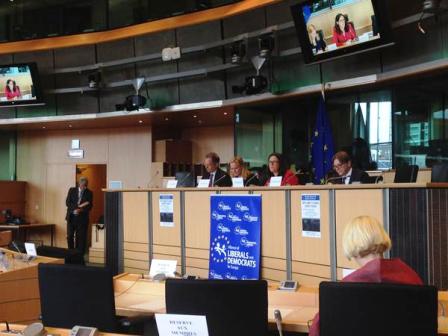ALDE Group in the European Parliament held on 3 June 2015 a conference on the geopolitics and trade politics of TTIP in the frame of the globalization era and explored why a smart TTIP would make Europe stronger. Accordingly, the geostrategic aspect of TTIP was covered by the distinguished speakers: Guy Verhofstadt (ALDE Group leader), Cecilia Malmstrom (EU Trade Commissioner) and Anthony Gardner (U.S. Ambassador to the EU).
The EU and the US together make up almost 50 per cent of global GDP and account for a third of global trade. But the impact of closer cooperation can go beyond just economic gains. A smart Trans-Atlantic Trade and Investment Partnership (TTIP) should have crucial geopolitical effect. TTIP could set global standards before other, soon larger, economies do so. To strengthen rules-based trade and our quality-of-life values on issues like health, food safety, labour laws and environment, we must act now. Diversifying our exports and globally strengthening rules-based trade is important for the EU, which is heavily dependent on exports. Additionally, an energy chapter will help the EU become independent of imports from countries such as Russia and Saudi Arabia.

ALDE’s coordinator on the Trade Committee Marietje Schaake (D66, the Netherlands) and event’s moderator pointed out:”In a global economy that is shaped increasingly by emerging powers, we seek to strengthen rules-based trade and high standards. A good TTIP strengthens Europe’s position in a changing world. By more cooperation between the world’s largest, most open economies and democracies, we have the chance to set high global standards and avoid a race to the bottom. When trade is realized without respect for people and planet, we all lose.” On Tuesday 8 June at 10.50 (ALDE press conference in Strasbourg), Guy Verhofstadt and Marietje Schaake will present the ALDE position paper “ALDE for a smart TTIP”.
During yesterday’s ALDE conference on the geopolitical aspects of TTIP (“Why a smart TTIP makes Europe stronger”), ALDE President Guy Verhofstadt referred to TTIP as a fundamental strategic issue and outlined four conditions the Transatlantic Trade Agreement (TTIP) will have to meet, to receive the support of the ALDE Group. The European Liberals and Democrats will judge the end result of the negotiations based on four key conditions:
1. TTIP must remove bureaucratic hurdles for European businesses
2. TTIP must advantage Europe`s small and medium enterprises
3. TTIP must ensure Europe’s environmental and social standards set the benchmark at global level
4. TTIP must introduce a modernised investment protection system
Furthermore, Guy Verhofstadt said: “We are in favour of a free trade agreement with the United States, but we have to construct it in a smart and transparent way without lowering the EU principles. We want a TTIP that delivers for Europe`s entrepreneurs and consumers, but also ensures that Europe can drive global standards. This agreement is an important opportunity for Europe to have more clout on the world stage.”
EU Trade Commissioner Cecilia Malmström underlined positive global and strategic impact of TTIP and its broadness. She stressed that the benefits of TTIP go far beyond the economics and include helping Europe shape globalisation and strengthen its energy security. Commissioner also made clear that TTIP would benefit other countries by making access to the EU and US markets easier. It would not negatively impact developing countries. According to her, there are three ways to look at the global impact of TTIP. One is to look at how TTIP supports our wider challenge of dealing with globalisation. A second is to see how TTIP supports the challenge of guaranteeing our security – In particular it can help us address an issue exemplified by the crisis in Ukraine: the impact of export restrictions on natural resources. Concerning the challenges and issues that torment Europe, she further explained that TTIP can help Europe becoming more energy efficient, creating a true Energy Union and exploring new energy sources within our own borders. And a final way is to see things from the perspective of other countries.
TTIP would be a vital step in that process because it would bring the world’s two largest economies together. And that would amount to a true global public good, added Commissioner.
She concluded that TTIP will certainly not solve all our problems, but it will help us across the board. We will have a stronger economy in both the EU and the US. That will benefit our trading partners, near and far. We will bolster our energy security, and finally we will strengthen our hand when it comes to setting the rules of the game.
U.S. Ambassador to the EU Gardner began his contribution by saying that TTIP is a historic opportunity to boost long-term growth but only an ambitious and comprehensive agreement will give boost to our economies. Moreover, TTIP is not a revolution, but an evolution of the transatlantic relationship. It will raise the bar for standards globally, and strengthen the geostrategic relationship between Europe and the US. He also referred to the great role that ALDE has played in approving an inter-resolution on TTIP negotiations. Thus, we need passion even more than statistics and geopolitics – an important component of trade deal- could contribute to that, while stressing out the importance of a rational and factual debate. He expressed his confidence that Congress will support TTIP.
In view of development in Ukraine and Russia, strategic rationale for TTIP has become more compelling. In that respect, Ambassador firmly believes that Kremlin hates TTIP and wants to keep Europe divided, vulnerable on energy. He supports Commissioner’s views and flagged up three issues: setting the rules of global trade, energy security and multilateral trade system. Given these points, for U.S. Ambassador to the EU, geopolitics of this trade deal is of the truly winning arguments and should be used more often.

